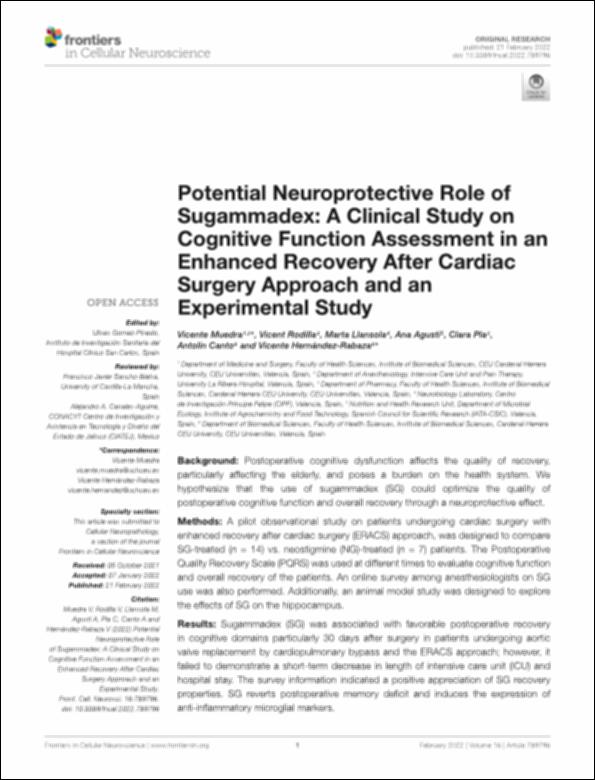Por favor, use este identificador para citar o enlazar este ítem:
http://hdl.handle.net/10637/14028Potential neuroprotective role of sugammadex : a clinical study on cognitive function assessment in an enhanced recovery after cardiac surgery approach and an experimental study
| Título : | Potential neuroprotective role of sugammadex : a clinical study on cognitive function assessment in an enhanced recovery after cardiac surgery approach and an experimental study |
| Autor : | Muedra Navarro, Vicente Rodilla Alama, Vicente Llansola, Marta Agustí Feliu, Ana Pla, Clara Cantó Catalá, Antolín Hernández Rabaza, Vicente |
| Materias: | Sugammadex - Therapeutic use.; Microglia.; Microglía.; Memory disorders.; Corazón - Cirugía.; Heart - Surgery.; Memoria - Trastornos.; Sugammadex - Uso terapéutico. |
| Editorial : | Frontiers Media |
| Citación : | Muedra, V., Rodilla, V., Llansola, M., Agustí, A., Pla, C., Canto, A., & Hernández-Rabaza, V. (2022). Potential neuroprotective role of Sugammadex: a clinical study on cognitive function assessment in an enhanced recovery after cardiac surgery approach and an experimental study. Frontiers in Cellular Neuroscience, vol. 16, art. 789796 (21 feb.). DOI: https://doi.org/10.3389/fncel.2022.789796 |
| Resumen : | Background: Postoperative cognitive dysfunction affects the quality of recovery, particularly affecting the elderly, and poses a burden on the health system. We hypothesize that the use of sugammadex (SG) could optimize the quality of postoperative cognitive function and overall recovery through a neuroprotective effect. Methods: A pilot observational study on patients undergoing cardiac surgery with enhanced recovery after cardiac surgery (ERACS) approach, was designed to compare SG-treated (n = 14) vs. neostigmine (NG)-treated (n = 7) patients. The Postoperative Quality Recovery Scale (PQRS) was used at different times to evaluate cognitive function and overall recovery of the patients. An online survey among anesthesiologists on SG use was also performed. Additionally, an animal model study was designed to explore the effects of SG on the hippocampus. Results: Sugammadex (SG) was associated with favorable postoperative recovery in cognitive domains particularly 30 days after surgery in patients undergoing aortic valve replacement by cardiopulmonary bypass and the ERACS approach; however, it failed to demonstrate a short-term decrease in length of intensive care unit (ICU) and hospital stay. The survey information indicated a positive appreciation of SG recovery properties. SG reverts postoperative memory deficit and induces the expression of anti-inflammatory microglial markers. Conclusion: The results show a postoperative cognitive improvement by SG treatment in patients undergoing aortic valve replacement procedure by the ERACS approach. Additionally, experimental data from an animal model of mild surgery confirm the cognitive effect of SG and suggest a potential effect over glia cells as an underlying mechanism. |
| Descripción : | Este artículo se encuentra disponible en la página web de la revista en la siguiente URL: https://www.frontiersin.org/articles/10.3389/fncel.2022.789796/full |
| URI : | http://hdl.handle.net/10637/14028 |
| Derechos: | http://creativecommons.org/licenses/by/4.0/deed.es |
| ISSN : | 1662-5102 (Electrónico) |
| Fecha de publicación : | 21-feb-2022 |
| Centro : | Universidad Cardenal Herrera-CEU |
| Aparece en las colecciones: | Dpto. Ciencias Biomédicas |
Los ítems de DSpace están protegidos por copyright, con todos los derechos reservados, a menos que se indique lo contrario.


